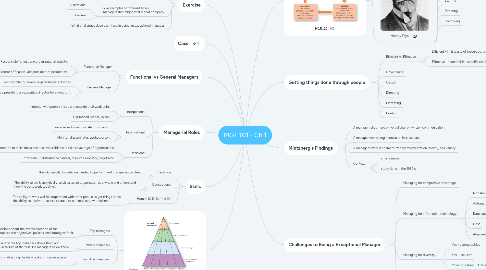
1. Exercise
1.1. Break into teams of 4 to 6
1.2. Choose a company to analyze
1.3. Give examples of different types managers that might exist in that company
1.3.1. 3 Functional
1.3.2. 3 General
1.4. What challenges dose each face in being an exceptional manager
2. Case
3. Functional vs General Managers
3.1. Functional Manager
3.1.1. Responsible for just one organizational activity.
3.1.2. For example, director of finance, vice president of production.
3.2. General Manager
3.2.1. Responsible for several organizational activities.
3.2.2. For example, executive vice president, an executive director for a nonprofit.
4. Managerial Roles
4.1. Interpersonal
4.1.1. Interact with people inside and outside their work units.
4.1.2. Figurehead, leader, liaison.
4.2. Informational
4.2.1. Receive and communicate information.
4.2.2. Monitor, disseminator, spokesperson.
4.3. Decisional
4.3.1. Use information to make decisions to solve problems or take advantage of opportunities.
4.3.2. Entrepreneur, disturbance handler, resource allocator, negotiator.
5. Skills
5.1. Technical
5.1.1. The job-specific knowledge needed to perform well in a specialized field.
5.2. Conceptional
5.2.1. The ability to think analytically, to visualize an organization as a whole and understand how the parts work together.
5.3. Human Skills (soft skills)
5.3.1. The ability to work well in cooperation with other people to get things done; the ability to motivate, to inspire trust, to communicate with others.
6. Levels
6.1. Top managers
6.1.1. Make long-term decisions about the overall direction of the organization and establish the objectives, policies, and strategies for it.
6.2. Middle managers
6.2.1. Implement the policies and plans of the top managers above them and supervise and coordinate the activities of the first-line managers below them.
6.3. First-line managers
6.3.1. Make short-term operating decisions, directing the daily tasks of nonmanagerial personnel.
6.4. Team leader
6.4.1. Responsible for facilitating team activities toward achieving key results.
7. POLC
7.1. Henery Fayol
7.1.1. Planning
7.1.2. Organizing
7.1.3. Staffing
7.1.4. Directing
7.1.5. Controling
8. Getting things done through people
8.1. Efficient vs Effective
8.1.1. Efficient - limit waste of resources, time, labor, or capital
8.1.2. Effective - accomplish a specific result
8.2. Governance
8.3. Gestalt
8.4. Directing
8.5. Mentoring
8.6. Leading
9. Mintzberg's Findings
9.1. A manager relies more on verbal than on written communication.
9.2. A manager works long hours at an intense pace.
9.3. A manager’s work is characterized by fragmentation, brevity, and variety.
9.4. Context
9.4.1. small sample
9.4.2. study done in the 1960's
10. Challenges to Being a Exceptional Manager
10.1. Managing for competitive advantage.
10.2. Managing for information technology.
10.2.1. Not about online shopping
10.2.2. Automation
10.2.3. Data capture
10.2.4. Cost
10.2.5. Adjacent Possible
10.3. Managing for diversity.
10.3.1. Yes - demographics
10.3.2. Yes - inclusion
10.3.3. More important - difference of thought and perspective
